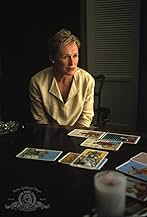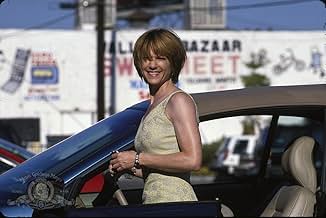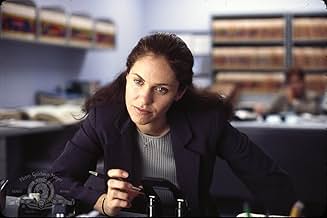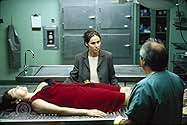IMDb RATING
6.4/10
7.6K
YOUR RATING
Five California women struggle with personal problems as their own paths unwind in unexpected ways.Five California women struggle with personal problems as their own paths unwind in unexpected ways.Five California women struggle with personal problems as their own paths unwind in unexpected ways.
- Nominated for 1 Primetime Emmy
- 2 wins & 1 nomination total
Penelope Allen
- Nancy (segment "Fantasies About Rebecca")
- (as Penny Allen)
- Director
- Writer
- All cast & crew
- Production, box office & more at IMDbPro
Featured reviews
This film is very slow but never boring and that's a remarkable feat. The acting is superb and the stories are emotional but never too sentimental. Just some more or less tragic women's stories in modern-day life.
Of course, there are many politically correct moves, like the lesbian couple, the black husband, the blind girl, the dwarf and the beggarwoman, but this is not really annoying. The only thing that I found a bit out of reality were the overly smart kids (i.e. Rose's son and the blind daughter).
All in all, good work on women's issues by male director.
Of course, there are many politically correct moves, like the lesbian couple, the black husband, the blind girl, the dwarf and the beggarwoman, but this is not really annoying. The only thing that I found a bit out of reality were the overly smart kids (i.e. Rose's son and the blind daughter).
All in all, good work on women's issues by male director.
A look at the lives of several different women in five separate stories. Writer-director Rodrigo García isn't indifferent to the characters he's depicting--one can sense that he wants to dig to the very core of a woman's emotional being with these portraits--but his chapters are handled oddly, in clinical fashion. Garcia also fails show off his star-actresses to their full advantages, particularly in the cases of Calista Flockhart and Holly Hunter--both weakly used. Of the group, Cameron Diaz is the most surprising, delivering a focused, balanced portrayal of a blind woman (her crying scene, shot in close-up, is quite stunning); however, these ladies aren't the living, breathing, suffering people they're meant to be. This unreleased theatrical feature, facile though it may be, was certainly a step forward in showcasing great femme talent, but the end result is a mixed-bag. ** from ****
This film consists of several different stories that are very loosely connected to each other. I was drawn into each individual story but would have liked to have known more about them. What would have made this film really good in my opinion is if there had been a single strong story line woven through all the stories; an interconnection that would have kept the coincidence intact, but would have made it an unseparable whole. That is what I missed. I am very happy though that at the end there was a kind of closing to each of the stories, but that really deserved more time. So a good film, with interesting characters and good portrayals, but it lacked the depth and interconnection that it made me both expect and hope to find.
Writer/director Rodrigo Garcia's feature film debut "Things You Can Tell Just by Looking at Her" might have a jarring, if too long, title, but the son of Gabriel Garcia Marquez presents a passionate work of cinematic fiction. The film presents several short stories; snapshots of women at a crossroads. One story is of a doctor who has lost sight of spiritual meaning in her life, and has elicited the assistance of a tarot card reader to help her find her way. This card reader may assist people with getting through the future with clarity, but she has one foot in the past as she watches her girlfriend succumb to a debilitating disease.
Each story intersects and overlaps the others in unique and interesting ways. The all-star cast of female talent bring to their deliberately under drawn characters some of their strongest performances, especially Calista Flockhart (at the time, fresh from "Ally McBeal") who provides her psychic character with fairy-like innocence, Kathy Baker who brings good-natured humorous curiosity to a role that could have quickly become a sociopath stalker, and Holly Hunter in an understated performance as a bank owner who contemplates the ramifications of motherhood on her life.
Each story intersects and overlaps the others in unique and interesting ways. The all-star cast of female talent bring to their deliberately under drawn characters some of their strongest performances, especially Calista Flockhart (at the time, fresh from "Ally McBeal") who provides her psychic character with fairy-like innocence, Kathy Baker who brings good-natured humorous curiosity to a role that could have quickly become a sociopath stalker, and Holly Hunter in an understated performance as a bank owner who contemplates the ramifications of motherhood on her life.
The greatest virtue of this movie resides in the close look the camera focuses on stories and characters. Slowly but relentlessly, humorous and cruel at the same time, it allows the time needed for seven wonderful actresses to reveal their most intimate and contradictory feelings, without relying exclusively on the dialogue. Thus, the stories really turn to be things you can tell about these women by just looking (attentively) at them.
And isn't watching carefully what a movie is about?
The result of this very "objective" look is the healthy absence of a moral, a trap writers tend to fall into when dealing with lesbian love, mortal diseases, abortion, loneliness, egotism, discrimination, etc.
It's been labeled by some as a "feminist" film, another often mistaken category into which films with women protagonists fall into. I believe it's far from being such. It should appeal to both sensitive and sensible men and women.
And isn't watching carefully what a movie is about?
The result of this very "objective" look is the healthy absence of a moral, a trap writers tend to fall into when dealing with lesbian love, mortal diseases, abortion, loneliness, egotism, discrimination, etc.
It's been labeled by some as a "feminist" film, another often mistaken category into which films with women protagonists fall into. I believe it's far from being such. It should appeal to both sensitive and sensible men and women.
Did you know
- TriviaA Braille book that Carol Faber reads is "One Hundred Years of Solitude" by Gabriel García Márquez who happens to be the father of Rodrigo García, this film's director.
- ConnectionsFeatured in The Rosie O'Donnell Show: Episode #4.170 (2000)
- How long is Things You Can Tell Just by Looking at Her?Powered by Alexa
Details
- Release date
- Country of origin
- Official site
- Language
- Also known as
- Con tan solo mirarla
- Filming locations
- Production companies
- See more company credits at IMDbPro
Box office
- Gross worldwide
- $1,433,668
- Runtime
- 1h 49m(109 min)
- Color
- Sound mix
- Aspect ratio
- 1.85 : 1
Contribute to this page
Suggest an edit or add missing content








































